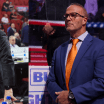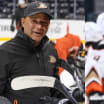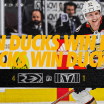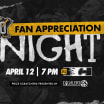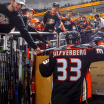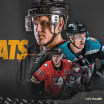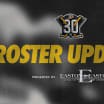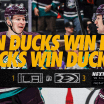Toyo Tires Ducks Alumni Spotlight: Joe DiPenta
The 'dependable' former Ducks defenseman has found a new calling in life with the Leukemia and Lymphoma Society
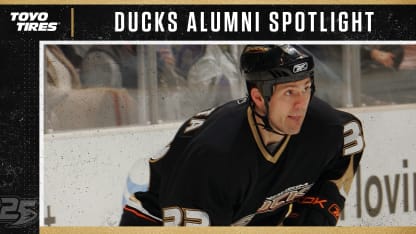
The former Ducks defenseman spends much of his time these days as the National Vice President, Development at the
Leukemia & Lymphoma Society of Canada
near his current home in Halifax, Nova Scotia.
It's a labor of love for DiPenta, who became involved in charity work during his time with the Ducks and helped launch a fundraising event called Shoot 4 The Cure Orange County that benefited CHOC Children's cancer patients. In addition to CHOC's longtime affiliation with the Ducks, the hospital is close to DiPenta's heart. Daughter Chloe was diagnosed with a birth defect that required surgery soon after she was born to Joe and wife Jessica in 2012, and she made a full recovery thanks in great part to the work of the CHOC hospital staff.
DiPenta, who spent 10 years in the AHL and NHL, played for the Ducks from 2005 through 2008, where the stay-at-home defenseman earned the nickname "Joe Dependable." He won a Cup with the Ducks in 2007 and ultimately walked away from the game in 2011 after stints with Anaheim's affiliates in Portland and Syracuse as well as a season in Sweden.
But DiPenta was only "retired" in name only, going back to school and earning a BA in Communication Studies from Long Beach State in 2013. That same year he and his family moved back to Halifax (not far from his hometown of Cole Harbour) and began working for the Leukemia and Lymphoma Society as Executive Director for Atlantic Canada. He was promoted to VP just about a year ago, overseeing the organization's fundraising across the country while directly supporting five Regional Directors and one National Director.
DiPenta, who just turned 40 last month, spoke about his post-retirement life and fondest memories of his time with the Ducks.
When you retired from the game, was it tough at all for you?
It's a difficult transition going from doing something you love and all of a sudden it comes to an end it's not easy for anyone. It certainly helped a lot when I discovered my new purpose was to work. Having not really done a whole lot of anything but playing hockey and going to school prior to that, to start off in a management role and a director role was a challenge, but it was really great. There's always sort of been a path for me, so I've been really lucky to have all these things go right. It's really perfect how it worked out in the sense that there was always something new, next and waiting. Having been pretty regimented as a professional athlete, always being on a team, it's hard to transition out of that. But I've been really fortunate with how life has happened over the last eight years. I have found a purpose that does drive me and that does get me excited every day. I have something to put my energy towards, and I feel like I have a lot to give still. Nothing will replace hockey, but having a passion that I can put my energy towards and make a difference, that's something that drives me.
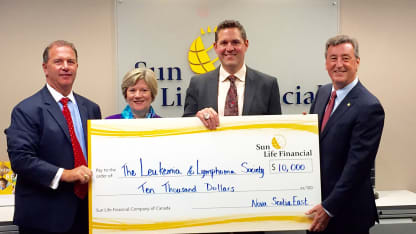
How did this opportunity come about?
When I first retired from playing, I didn't really have a feel for what I wanted to do. My best friend back here in Halifax was sick and was in the hospital, and he was really not doing well. So, I flew home to see him, and while I was home for five days without my wife and daughter, I started to ask around if there were any job opportunities back here. I called two people that I knew, and they passed me on to a recruiter. She asked me if I ever thought about the non-profit sector, and then she went on to tell me about the Leukemia and Lymphoma Society. She said there was this new role that had never existed before in this region, and they were looking for somebody who wanted to build it. It really spoke to me, and I had raised money for blood cancer patients in Anaheim as a Duck, and it just all kind of fell into place. It was like I knew how to fundraise, I had already put on an event so I kind of knew how to relate to some of the volunteers here in Halifax, so it all kind of lined up. I feel like it's a really good fit for me.
Not that long ago, you were back in Anaheim for the 10-year anniversary celebration of the Stanley Cup team. What was that experience like?
That was a lot of fun. When we played, we were a really strong team off the ice as well as on the ice. We were close. It was really cool to see each other. You look back at each of our careers and most of us most of us didn't win another Stanley Cup so that's still a highlight for us, that team, and it's just special. We're always going to share that bond, so getting together is really rewarding. It's almost like the 10 years that passed, we picked up right where we left off and had the commonalities and lots of catching up and laughs and fun. We got treated extremely well by the organization, and hopefully it was rewarding for the fans too.
Many have made a case for that 2007 team being one of the best Cup teams of all time? I'd imagine you agree?
Yeah, I believe so. We were extremely tough, intimidating, we played a style that was fitting to the playoffs. We were a defensive-minded team and we had such firepower. We played such a defense-first style and we had such strong goaltending and of course our back end was strong with Chris Pronger] and Scotty [Niedermayer], who would play fifty minutes a night between the two of them. So it was a pretty hard team to play against. I read some articles after the fact, and
[one article in the Hockey News
compared us against the [1976-77] Montreal Canadians team that only lost [eight games in regulation] the entire season. They matched us up against them and they actually said we would have beaten them.
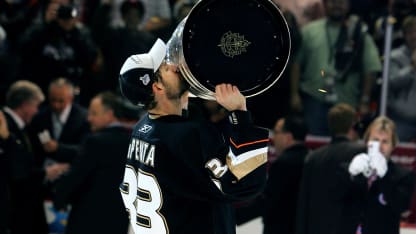
So, it's very humbling to think that we were a team that is compared against some of the greatest of all time. At the time, in the moment, you don't think of those things. You're just focused on every game is a challenge and you need to bring your A game if you're going to win. I would look back at some of those playoff games and I remember thinking we never truly played a full 60 minutes at any point during that playoff run. It seemed like there was always a little gap here and there where we still didn't quite play to our potential. We would talk about it in the intermissions. So for a team that didn't play a full 60 all the time and to go 16-5, that speaks to how good we were.
The genesis of that team goes back to the 2005-06 season, your rookie year in the NHL. That team didn't get off to a great start but really came together and made it to the Western Conference Final.
Yeah that's for sure. I remember one of the turning points that season was in November, and we were playing the Kings and both of us were kind of equal teams. I remember [head coach] Randy Carlyle and [General Manager] Brian Burke giving us some type of a talk about how we were really comparable to them on paper, but the game was going to be won by who wanted it more. And [Assistant Coach] Dave Farrish said not to worry about the outcome, worry about the process. If you worry about the process, the outcome will take care of itself. We won that game, and it was from that moment on that I felt like we just bought in to the whole idea that if we worried about each of our shifts that we're going to win games. That was my rookie season in the NHL, and it was the best season I played personally. I was 27 years old, and I played my best hockey that year.
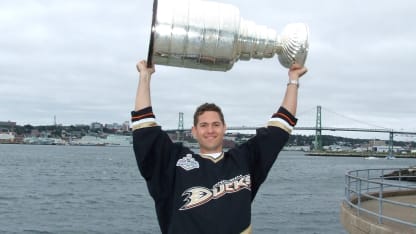
The next season, you became the first player from Cole Harbour to win a Cup. Is there a lot of pride in that, considering Sidney Crosby is also from your hometown?
Oh, for sure. It's a big joke that I often use as an opening line for a presentation that I'll do in the community here. Because everyone knows Sidney, and when he won the Cup with the Penguins, Cole Harbour really became famous. Most people don't know that the Ducks won before the Penguins did. That's not something that most people remember, so my one-liner is I was the first hockey player to bring the Stanley Cup back to Cole Harbor, Nova Scotia. Of course, most people guess that it was Sid, so that's something that kind of gives me a one up on him. But that's about all I have on Sid.
Now that you're comfortably in this position in your career, what do you see the future holding for you?
That's a great question. I started off in fundraising and then management, so I was leading a team to raise money and to help blood cancer patients. Now I'm kind of moving into a role of coaching other regional directors and helping them be successful. That's been rewarding for me, and I feel like I'm good at coaching others, and I'm really passionate about some of the things we've done as an organization. So, I can see myself moving into roles in the future that I'm able to do that more, where I can coach people and help people be better and they can have success. I feel like my mission statement is to be a servant leader to individuals, teams and organizations that want to have a transformation in their direction. I really see myself as a coach that helps organizations or individuals take that next step.


